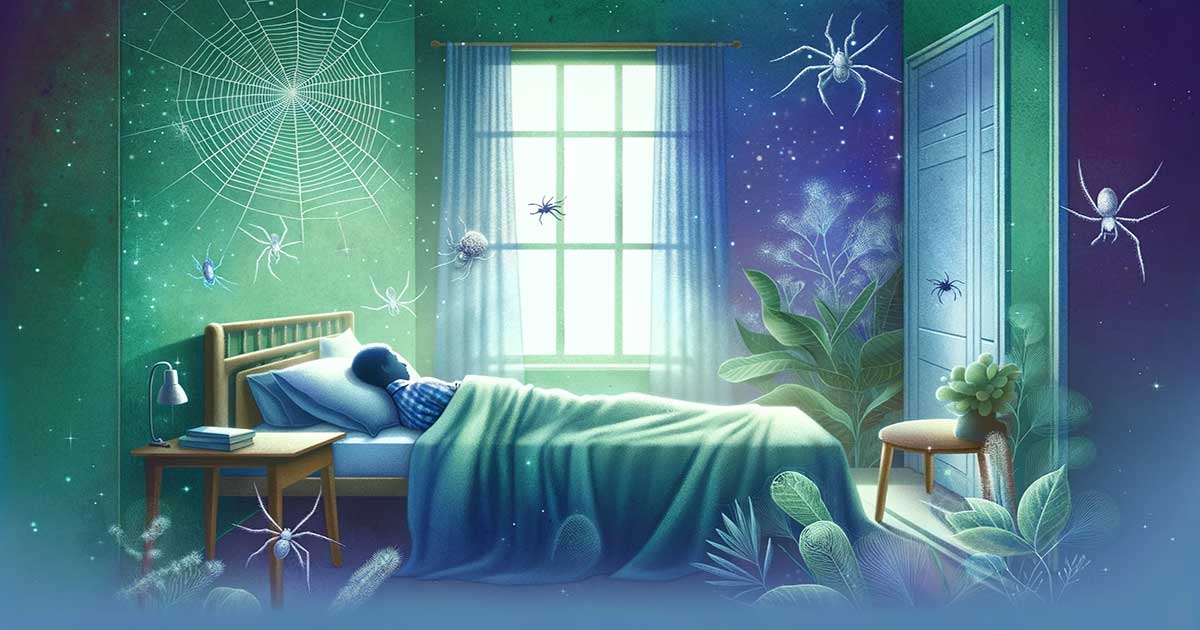The narrative of humans regularly swallowing spiders in their sleep is more fiction than fact. While not entirely impossible, the occurrence is exceedingly rare. This myth serves as a striking example of how misinformation, particularly when intertwined with deep-seated fears, can embed itself in the public consciousness. With a mix of scientific evidence and a better understanding of both spider behavior and human psychology, we can confidently put this myth to bed, ensuring more restful and less buggy nights ahead.
People Swallow Spiders in Their Sleep myth

Is it True That We Sometimes Swallow Spiders in our Sleep?
The widespread belief that people unknowingly swallow many spiders during sleep each year is a myth. In reality, spiders rarely come into contact with humans during their sleep, and the chances of swallowing spiders in this context are extremely low.[1] [2]
Do we swallow spiders when we sleep?Introduction: Debunking the Spider-Swallowing Myth
The widely circulated claim that humans unknowingly swallow a significant number of spiders during sleep has been a topic of both intrigue and discomfort. This article delves into the origins and validity of this belief, evaluating it through the lens of entomology, human behavior, and psychological factors. Prepare to unravel the threads of this fascinating, albeit unsettling, myth.
Summary of the Evidence
To dismantle this myth, let’s look at the behavior of spiders and the environment of human sleep:
- Spider Behavior: Spiders, for the most part, are solitary creatures and tend to avoid humans. The idea that they would intentionally crawl into a human mouth is contrary to their survival instincts. Spiders are more likely to flee from larger creatures, including humans, than approach them.
- Human Behavior During Sleep: Humans are not passive during sleep. We breathe, move, and make noise – all actions that would deter a spider. The likelihood of a spider approaching a breathing, sometimes snoring, creature is extremely low.
- Entomological Evidence: Studies in entomology (the study of insects) indicate that spiders prefer environments that are not as warm and moist as the inside of a human mouth.
We will go deeper into those topics below, for now, that will provide the basic reasoning for why we can safely consider this one a myth. However, you’ll want to read the next section, because the known parts of the origins of this one are pretty interesting.
Unraveling the Origins of the Spider-Swallowing Myth
Claims of people ingesting multiple spiders annually while asleep, has no definitive origin but have gained significant traction in modern folklore. Its persistence is likely tied to deep-rooted fears and the uncritical acceptance of so-called “factual” information. In fact, the most interesting part of this whole story might be some modern roots of misinformation.
Snopes, Lisa Holst, and a Lesson in Guliblity
The tale of the spider-swallowing myth is entangled in layers of misinformation, notably linked to a 1993 article attributed to Lisa Holst in “PC Professional” magazine. This article, as reported by Snopes, is said to have fabricated the spider statistic to demonstrate public gullibility. However, this narrative itself was later debunked, revealing another layer to the myth – the story of Lisa Holst is likely an invented cautionary tale about believing everything we read. [3][4][5]
Spider Behavior: Debunking the Ingestion Myth
Delving deeper into spider behavior further unravels the myth. Spiders, being predominantly solitary, exhibit behaviors and preferences that minimize their contact with humans. For instance, they are sensitive to vibrations and disturbances, which are common in human habitats, especially when humans are active or even moving during sleep.[6]
Additionally, spiders’ environmental preferences contradict the conditions of a human sleeping area. They thrive in stable, undisturbed settings and often select secluded corners to build their webs, far from the potential disturbances of a human bed. The idea of spiders intentionally entering a moist and periodically inhaling environment like a human mouth conflicts with their instinctual behavior for self-preservation.
The Human Factor: Fear and Gullibility
Arachnophobia significantly influences the persistence of the spider-swallowing myth. This fear, often rooted in evolutionary and cultural factors, can lead to an exaggerated sense of risk regarding spiders. The human brain is wired to remember information that elicits strong emotional responses, like fear, making such myths more memorable and shareable.[7]
Moreover, cognitive biases play a role. Confirmation bias, for example, can lead people to accept information that confirms their pre-existing fears or beliefs, regardless of its veracity. The spider myth thrives on such biases, as it aligns with common fears and misconceptions about these arachnids.
These enhanced sections aim to offer deeper insights into the science behind the myth and the psychological factors contributing to its persistence. The goal is to provide a more rounded, informative, and engaging narrative that addresses both the myth itself and the broader implications of belief and misinformation in society.
- Swallow 8 Spiders While you Sleep – The Washington Post
- Debunking the Myth: Swallowing Spiders in Your Sleep – Burke Museum
- Is Lisa Holst Responsible for the Spider-Eating Belief? – Skeptics Stack Exchange
- Swallow Spiders Fact Check – Snopes
- Lisa Birgit Holst and the Spider Myth – Snopes
- Understanding Spider Behavior – Smithsonian’s National Museum of Natural History
- Dr. Geoff Cole’s Research on Arachnophobia – Sage Journals
